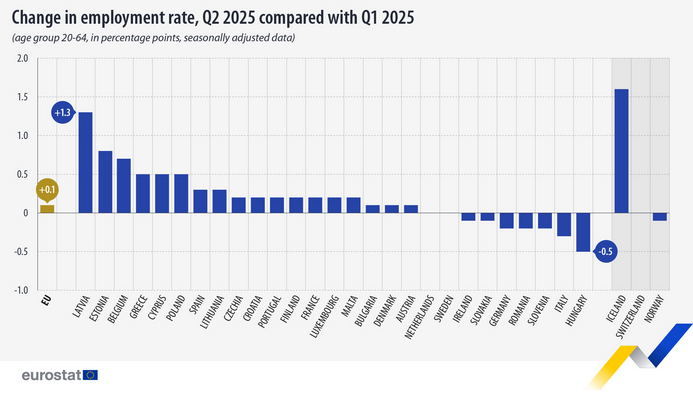Blog
The “iron rice bowl” of computer science is shattered! A Berkeley professor exclaims: Graduates are all struggling to find jobs!

This is a shocking and cruel fact! Just a few years ago, obtaining a graduation certificate in computer science was equivalent to having a pass to financial freedom. However, today, this “golden age” has come to an abrupt end!
Hany Farid, a professor of computer science at the University of Berkeley, hit the nail on the head and told the world straightforwardly, “Everyone is struggling to find a job!” This transformation has been so rapid and sudden that it has caught the entire industry off guard. Is this a brief cold wave or a structural turning point in the digital age?
Ten years on the east side of the river, ten years on the west side: From “Hot Commodities” to “Slow-moving items”
Think about what it was like ten years ago? GAFAM (Google, Apple, Facebook, Amazon, Microsoft) and countless start-ups have an insatiable thirst for talent. Students majoring in computer science need not worry at all. Before graduation, they already have several offers from top companies in their hands, which can be overwhelming!
But what about now? Professor Farid, in Nova’s podcast, used a vivid example to reveal the harsh reality. He mentioned a friend who was promised four years ago that “studying computer science will surely lead to a bright future”, but now this soon-to-be graduate is struggling in the quagmire of job hunting.
Professor Farid witnessed the same scene in Berkeley, which is known as the garden of computer science. He exclaimed, “It’s incredible!” In the past, students held five or six offers and compared them with each other. Now, they would be extremely grateful if they could just get an Offer!
This is by no means an accident! It marks a fundamental shift in the recruitment strategy of enterprises. The extensive growth model of “recruiting talents widely” in the past has come to an end, replaced by extremely strict screening. The debate within Silicon Valley about the future of computers has long been intense. The ability of AI to create software independently has put everyone on edge. Brett Taylor, the chairman of OpenAI, even advised students not only to learn programming languages but also to delve into deeper computer concepts!
Is AI a disruptor or a “scapegoat”?
The number one “suspect” of this crisis is directly pointing to artificial intelligence (AI).
When AI tools can automatically generate code, automate testing, simplify integration, and significantly shorten the development cycle, a large amount of work that originally belonged to junior programmers is instantly swallowed up by machines.
But Professor Farid soon put forward a deeper insight: AI is merely a catalyst that has accelerated the rationalization process of the technology industry. After years of wild expansion, what enterprises are now pursuing is maximizing efficiency. The result is that those “standardized” talents are facing unprecedentedly fierce competition, while the remaining positions are concentrated in high-precision niche markets: security, data engineering, applied AI, distributed infrastructure, etc.
The “time difference” in the education system: What schools teach, enterprises don’t want!
What is even more worrying is that universities and engineering colleges seem to be lagging behind The Times.
Our courses still emphasize the unchanging fundamentals such as algorithms and data structures, but they are slow to respond to the practical tools and practices that enterprises use every day: data pipelines, MLOps (Machine Learning Operations), native cloud deployment, large-scale security protection…
A huge gap is widening between recruiters and graduates! What enterprises need are engineers who can immediately engage in combat, directly participate in the implementation of AI projects, and manage cloud infrastructure. Although graduates have solid theoretical knowledge, they often lack the specific practical experience that enterprises need.
Market polarization: Are Ordinary People Being “Kicked out”?
Another factor that exacerbates the predicament is market saturation. Over the past decade, countless people have flocked into the computer field. Now, the market has suddenly found that the number of talents entering has exceeded the current demand.
Although “elite” talents, such as graduates from the most prestigious universities or those with scarce professional skills, still have no worries about finding jobs. But those graduates from ordinary schools or those without any outstanding specific project experience are being ruthlessly marginalized in this competition.
We are witnessing a cruel polarization: a few top talents monopolize the majority of offers, while the vast majority of graduates are struggling for their first job.
Goodbye, “jack-of-all-trades” programmer!
The era when “as long as you could write code, you could find a job” has come to an end completely!
Professor Farid disclosed that his advice to students has changed. He no longer advises students to focus on just one field, but advocates for “hybrid” talents: those who can do various things, possess strong adaptability, and be able to predict the next wave of technology.
This “all-rounder” ability is of vital importance. The linear career development path of “mastering Java, finding a job, and gradually upgrading” is dying out. In its place is a “zigzagging” development, which requires constantly updating skills, exploring new fields, and integrating technical capabilities with strategic vision.

AI Disruption Everyone is struggling to find a job AI
The huge shockwave that young people are facing
The consequences brought about by this crisis are extremely heavy.
The first is the psychological impact: Many people choose computers because they are attracted by the job security they offer. Now, they find that everything is unknown. The starting salary may be lowered and internship opportunities will no longer be automatically converted to regular positions.
The second is structural risk: If young people cannot find their place, the entire industry may lose the “fresh blood” needed for innovation. They might be forced to switch careers to neighboring fields such as consulting and product management. A market that is overly picky will eventually weaken itself.
The chairperson of the Federal Reserve said: AI might be an “accomplice”!
This employment predicament has already alarmed the top levels in Washington! The soaring unemployment rate among people under the age of 25 in the United States has become one of the most worrying economic issues in 2025.
Federal Reserve Chair Jerome Powell confirmed economists’ concerns at a press conference after the Federal Open Market Committee (FOMC) meeting. He pointed out that the current labor market is an “interesting” one and solemnly stated: “Young graduates, ethnic minorities and disadvantaged groups are all striving to find jobs.”
He particularly mentioned that although both the layoff rate and the recruitment rate are very low, this economic model of “no layoff, no recruitment” has particularly hurt young people. Chair Powell made it clear that the rise of AI is very likely to be part of the reason for this situation!
What was once a “golden career” has now become a “struggling ground”. How can young people save themselves? Will the wave of technology bring about new prosperity or trigger a major reshuffle in the social structure? How will this employment crisis involving AI reshape our perception of knowledge, education and future careers?
When “programming ability” is no longer a value anchor
Professor Farid was shocked to see that a profession once regarded as the “insurance policy of the future” suddenly lost its value anchor. In the past, the value of computer science lay in its scarcity, complexity and direct contribution to economic growth. However, the rise of AI is undermining these three cornerstones.
The Disintegration of Value Anchor Points: From Scarcity to “Redundancy”
In the traditional industrial and information age, programming ability was a scarce resource, corresponding to high salaries and a bright future. However, the emergence of generative AI (especially LLM) is transforming basic code generation and debugging from scarce skills to redundant capabilities at an exponential rate.
This raises a core question in philosophy: When human cognitive labor is “commoditized” by machines, who exactly defines the value of human labor?
If AI can complete the work of junior engineers at an extremely low cost and with extremely high efficiency, then the value of these positions will approach zero. This is not merely a supply and demand relationship in economics, but also an erosion of human dignity. How can a young person position their self-worth when the skills they have mastered over four years and at a huge cost of tuition fees are replaced overnight by an algorithm? This is a kind of “Deprived Achievement” (Deprived achievement). The spread of this feeling has dealt a far greater blow to social stability and the spirit of innovation than we could have imagined.
The Crisis and Rebirth of Education
Professor Farid also pointed out the disconnection between university education and industrial demands. This reveals a deeper crisis of “Disenchantment of Knowledge”.
The modern education system is built on the foundation of “systematic knowledge imparting”. It is believed that by learning basic theories such as algorithms and data structures, students can be provided with long-term competitiveness. But AI has shattered this belief:
The immediate availability of knowledge: AI makes the cost of acquiring knowledge almost zero. The value of memory and retrieval drops to zero.
The application scenarios of knowledge: What enterprises need are “plug-and-play” talents who can integrate AI into the production process, rather than “general-purpose” talents who merely master theories.
This crisis forces us to rethink the ultimate purpose of education. If a university is no longer a “warehouse” of knowledge but merely a “theoretical training ground”, what is its significance of existence?
I believe that education must shift from the traditional “knowledge imparting model” to the “cognitive shaping model”. In the future, universities should no longer teach “how to write code”, but rather “how to coexist with AI, how to master AI, and how to think critically about the ethical and social impacts brought by AI”.

AI disruption graduation certificate in computer science financial freedom
The paradigm shift from “general-purpose talents” to “rare experts”
The current job market is biased towards highly specialized elite talents. This is a profound paradigm shift:
Old paradigm: Cultivate a large number of “screws” who master general skills to adapt to standardized production.
New paradigm: The demand is concentrated on a few experts in “AI-Human collaboration”, who possess irreplaceable and rare capabilities.
Professor Farid suggests that students should “be good at many different things”, which does not simply require “versatility”, but rather a kind of “Trans-Cognitive Ability”.
The value of the future does not lie in “quantity” (that is, how much code has been written), but in “quality” (that is, how good the questions have been raised and how complex the problems that require interdisciplinary insights have been solved). Only those who can combine profound domain knowledge (such as medicine and law) with critical AI management skills can find a foothold in the future.
This crisis poses a philosophical challenge to our society: Can we pursue technological efficiency while still safeguarding the dignity of human labor and the value of the individual? The answer depends on how we reshape our education system and values.
How can educators transform and what should children learn?
In the face of the structural crisis brought about by AI, the education system must undergo thorough and non-incremental changes. This is not a problem that can be solved simply by adding an AI course to the existing curriculum; rather, it requires reshaping human cognitive structure and survival skills.
I. The Role Transformation of Educators: From “Knowledge Authority” to “Cognitive Guide”
Educators must abandon their traditional authoritative status as “knowledge transmitters” and transform into “cognitive guides” and “complexity coaches”.
Old role: Authority on knowledge New role: Cognitive Guide
Impart known knowledge to stimulate curiosity about the unknown
The scoring criteria and answers cultivate questioning and critical thinking
Emphasize the volume of knowledge and memory, as well as interdisciplinary connections and innovative practices
Teach technical tools (such as programming languages) to guide ethical thinking (such as AI bias, data privacy)
Ii. Core Learning Contents and Methods for Future Students (K-12 to University)
Learning in the AI era must revolve around the irreplaceability of human beings. The core competitiveness in the future will be those “soft skills” and “deep cognitive abilities” that are difficult for machines to imitate.
1. The Mindset Shift
Critical Questioning ability (critical Questioning) :
Learning content
Teach children not to be content with the answers given by AI, but to learn to question the source of data, challenge the logic of algorithms, and raise deeper questions. This is the only way to combat the “hallucinations” and “cognitive biases” of AI.
Learning methods
Adopt Socratic Dialogue and debating learning to enable students to engage in critical thinking in complex situations without standard answers.
Trans-Disciplinary Synthesis
Learning content
Integrate liberal arts, science, engineering and business, and break down disciplinary barriers. For instance, let computer science students study the application of AI in ancient philosophy and ethics, and let art students learn the mathematical principles behind generative AI.
Learning methods
Project-Based Learning (PBL), in which all projects must involve knowledge from at least three different disciplines, emphasizes “solving complex problems in the real world that have no preset answers”.
2. The Human Edge
Emotional & Empathy Intelligence
Learning content
After AI takes over most of the “rational” work, “human-to-human connection” will become the greatest value. Strengthen education in psychology, sociology and ethics to cultivate students’ empathy, leadership, teamwork spirit and conflict resolution ability.
Learning methods
Team collaboration, community service and role-playing simulation. The focus of education should shift from “teaching” to “nurturing people”.
Creativity & Aesthetic
Learning content
AI can generate images and text, but it fails to understand the value of “beauty” and the motivation behind “creation”. Strengthen aesthetic education in art, music, literature and other fields to cultivate children’s originality, aesthetic appreciation and pursuit of “the beauty of the useless”.
Learning methods
Encourage “art-science” cross-disciplinary projects, allowing children to use AI tools for creation, but the core value lies in the meaning and emotions bestowed by humans.
3. The AI Literacy
The ability to “master” and “manage” AI:
Learning content
It is no longer the traditional “hard coding”, but “Prompt Engineering”, AI model evaluation, data governance and ethics. Learn to manage AI like a management tool, and understand the capability boundaries and shortcomings of AI.
Learning methods
Involve students in the design and evaluation process of AI models, understand the generation mechanisms of data bias and algorithmic bias, and propose ethical solutions.
Iii. Future Education Model: Lifelong Learning and Adaptability
For teenagers, the most important thing is to establish a cognitive model of “continuous learning and adaptability”. They must understand that no major is a “secure job for life”, and a career will be a continuous process of “rediscovering oneself”. Educational institutions need to establish closer cooperation with the industrial sector and offer short-cycle, high-intensity “skill reshaping” courses to address the challenges of rapid technological iteration.
The ultimate goal of future education is no longer to cultivate “knowledge workers”, but to foster “cognitive explorers” who have souls, critical thinking abilities, can collaborate with machines, and can create new value for human society.

AI disruption Graduates are all struggling to find jobs



Thanks for the article. There are one or two typos that have slipped, feel free to correct:
-… The ability of ai to create software autonomously…
An ai cannot create software independently. Even openai’s boss doesn’t claim such things. Of course, there are others who do not know what they are talking about and who abuse a certain language.
-… Golden age of “coders”…
I think we used to talk about engineering, or software engineering. This makes sense, because the “code” part is the simplest. The understanding and mastery of a trade and related constraints to set up technological solutions is devolved to engineers and developers. So I have never seen in a serious magazine use this term, nor speak of the golden age of coders. This is totally wrong, ridiculous and absurd. It is, however, the generic and misplaced term used by ai lobbyists.
There are great opportunities to work with ai. And it’s a shame to always bring everything back to code, because that’s where it’s the most basic and least efficient I find. Except for quite boat things, but no need to cramer a power plant for that.
For those who really have fibre in terms of technology, there are always jobs. Ai solutions are not created by ai. Engineers are needed. Model training and refinement is not ai-driven. Experts (and exploited people somewhere in Asia) do the work.
I sometimes have the impression that we are playing the fool’s game of the big American industrialists. The boss of NVidia amused me, with his speech aimed exclusively at an audience of investors in order to increase the capitalization of his company, and grow its comfortable added value. And everyone takes him for a diviner.
I had imagined that in our time we had learned from the medieval past and from all our superstitions and beliefs. With the increasingly polarized and extreme speeches we encounter, whatever the field, I was visibly wrong.
The rise of ai would be putting generation Z at risk, and ChatGPT is requisitioning the commonplace tasks that young employees relied on to advance their careers
The rise of ai would be putting generation Z at risk, and ChatGPT is requisitioning the commonplace tasks that young employees relied on to advance their careers
The advent of ai allows some companies to reduce the need for labor, but it would also hinder the career start of young generation Z. ai systems such as ChatGPT would have begun to take over the “junior” tasks that companies entrust to young graduates (on internships or newly employed) to enable them to gain experience. Recent observations seem to show that this phenomenon has grown and that ai systems are encroaching on the training and career development of young employees. In addition, businesses would reduce investments in mentoring.
The generative ai boom has become a boon for companies that want to automate spreadsheet creation, generic writing, and other monotonous tasks in the name of greater efficiency. The technology has fascinated ceos and the workplace industrial complex, which has led many companies to try out ai, including openai’s ChatGPT ai chatbot or other such systems. Although the results of these experiments are mostly, many leaders and the managerial class are all acquiesced in ai. They are on the lookout for any software integrating the capabilities of generative ai.
But, according to a recent report by Business Insider, the people that this new technology will actually affect have been less considered. The mundane tasks that have so far been replaced by ai are usually performed by novice workers. Managers assign these tasks to new employees in the hope that they will be completed quickly, correctly and without anyone needing to explain how to do it. This work is presented as an essential part of their evolution, a means of “earning their stripes” in the workplace. But ai has seized it and young people would be sidelined.
Name: McRisara-ai-chatbot-customerservice-office-space-telemarketers-f783ec0e-24fe-4220-96f9-edf3fa825.png
Views: 4814
Size: 535.1 KB
In this regard, several surveys have revealed that generation Z members are particularly concerned about the impact of ai on their careers. In a recent survey conducted by the job site ZipRecruiter, about 76% of generation Z members said they feared losing their jobs to ChatGPT. According to the report, young workers are heading for an occupational disaster. They may be more comfortable than their older colleagues to use ChatGPT and other ai technologies, but managerial obsession with ai threatens to undermine young employees’ ability to launch a career.
Leaders would have spent decades disconnecting from the young workers who are the backbone of their companies. And if these leaders already refuse to train their young employees, it is not surprising that they are ready to get rid of them. According to the report, even before the rise of ai, young people were facing an early career crisis. Of course, on the surface, it seems that generation Z is entering the labor market at an ideal time. It seems easier to find a job than before, thanks to a historically low unemployment rate, and the wages of young workers have risen at a steady rate.
However, analysts say that on closer scrutiny, there are growing signs that young people will find it much harder to build a career. According to them, no one seems to want to train young people anymore. For example, Workplace Intelligence, a human resources research company, said that in a survey it conducted with Amazon in 2022, 74% of generation Z and millennials said they were considering leaving their jobs “due to insufficient support for skills development or a lack of job mobility options.”
In the absence of training and real professional development, the young employees of recent years would have had only one way to learn the tricks of the trade: the thankless and subordinate tasks. In theory, these small jobs were intended to familiarize young workers with simpler processes and to prove that they were competent enough to take on more difficult tasks. But with the advent of generative ai in the workplace, the game has changed. According to analysts, companies’ particular disdain for the young generation Z means that ai will hit them harder than their elders.
To justify the adoption of ai, some leaders claim that the most tech-savvy among young workers will become the guardians of these new machines. In reality, it means that young people will end up cleaning up the deluge of errors that these faceless ai tools spit out, knowing that they will receive less credit because the “work” comes from a machine. According to analysts, this situation is likely to create a career crisis for young employees: if any freedom is removed from their working life, young workers will have less means to prove that they are able to accept a more meaningful job.
“The funny thing is that ChatGPT is not good enough at anything to be given a given task. You always need a subject matter expert to reread anything that will be seen by the public or used to make an important decision, “wrote one reviewer. But the same could be said of a beginner, because the latter also needs to be supervised in his work. The two situations seem similar, but experts believe that it is much more profitable for companies to hire beginners and train them so that they become autonomous over time. In their view, this benefits both sides.
Studies suggest that firms investing in vocational training and skills development are more efficient and achieve higher profit margins. “Humans can be improved by ai, helped by ai, but replacing them with ai is a reckless decision made by short-sighted accountants who don’t see the value of a person. The question is whether investments in ai should instead be replaced by real training and mentoring programs with financial rewards, “says the report. The topic has provoked a great debate on the web.